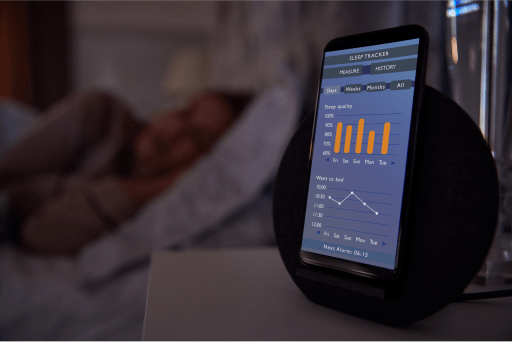How it Works


Step 1
Your First Appointment
Your first appointment will last approximately 50 minutes, and
your clinician will go through a comprehensive diagnostic
evaluation of your insomnia. Your clinician will use this
evaluation to thoroughly assess your sleep patterns and
pinpoint some of the potential root causes of your insomnia.
You and your clinician will also discuss your main treatment
goals, so that they can help create a tailored treatment plan
for you based on your sleep challenges and goals.


Step 2
Developing Your Sleep Plan
By the end of your first appointment, your clinician will
craft a personalized sleep treatment plan for you based on the
specific causes of your insomnia. Your initial treatment plan
may include strategies such as sleep restriction therapy,
cognitive restructuring, sleep anxiety treatment and
behavioral or environmental changes.
Your treatment plan is designed to be dynamic, evolving as
your clinician monitors your progress and responses to various
interventions. This systematic approach ensures that we can
effectively address the root causes of your insomnia.
To make it easier to follow, your clinician may provide your
treatment plan through a mobile app, giving you clear, daily
steps to follow. This digital tool will help you stay on track
and assist your clinician in making adjustments as necessary
to your treatment.


Step 3
Ongoing, Weekly Sleep Treatment
During this phase, you'll engage in regular weekly sessions with your sleep clinician. These sessions are focused on administering your custom sleep treatment, monitoring your ongoing progress, and adjusting the plan as required. This systematic approach ensures that your treatment remains effective and responsive to your evolving sleep needs.
Frequently Asked Questions
What is insomnia?
Insomnia is a common sleep disorder that's characterized by the persistent struggle to fall asleep, stay asleep, or both. Most often, people with insomnia feel unsatisfied with their sleep and may experience fatigue, low energy, difficulty concentrating, mood swings, and decreased performance at work or school.
One of the more interesting aspects is that its duration can vary significantly. In some cases, it appears as acute insomnia, which is a short-term condition that lasts only a brief period of time. However, there's also what's known as chronic insomnia, which is more prolonged and typically occurs at least three nights a week and continues for three months or longer. Regardless of its duration, insomnia significantly impacts daily life. Therefore, treatment is necessary for improved well-being.
What is sleep therapy?
Cognitive Behavioral Therapy for Insomnia, or CBT-I, is a
highly effective, evidence-based method for treating
insomnia. Unlike traditional sleep medications that offer
temporary relief, CBT-I helps determine the psychological
and behavioral roots of sleep issues. In fact, its primary
goal is to identify and modify the patterns that
contribute to insomnia, ultimately helping individuals
regain control over their sleep patterns and improve their
overall sleep quality - for good!
CBT-I goes beyond addressing immediate sleep problems; it
equips you with strategies for maintaining healthy sleep
patterns. It's a proven, effective approach that provides
long-lasting relief for those dealing with sleep
disturbances.
What is included in my treatment plan?
Your treatment will consist of an initial 50-mins
evaluation by one of our sleep clinicians to diagnose the
underlying factors (commonly known as the 3Ps of insomnia
- predisposing, precipitating and perpetuating factors)
that may be contributing to your sleep issues.
Your specific treatment plan will depends on
that initial evaluation. It usually consists of a
combination of stimulus control, cognitive restructuring,
sleep restriction therapy, relaxation training and general
therapy.
How long is the treatment?
The duration of the treatment depends on a host of factors, including the severity of your insomnia, your age and your lifestyle. A majority of our patients start experiencing noticeable improvements within the first 2 treatment sessions.
Is there an age limit?
CBT-I is indicated for adults above the age of 18. If you are under 18 years old, please consult your healthcare provider for care advice with your sleep.
Is CBT-I safe for everyone?
CBT-I uses sleep restriction and consolidation, which may
cause daytime sleepiness until sleep has been regulated.
In general, CBT-I is safe for most people. However, please
let your clinician know during your initial consultation
if you have any of the following conditions or disorder:
+ Bipolar disorder
+ Epilepsy
+ Untreated obstructive sleep apnea
Please also let us know if you're in a profession where
you need to be alert or cautious to avoid serious
accidents (e.g. air traffic controllers, operators of
heavy machinery, long-haul truck drivers), so we can
adjust your treatment plan accordingly.
Do you offer sleep testing?
We do not treat sleep apnea directly or conduct sleep
studies.
Sleep testing is generally offered when a provider
believes that you may have breathing problems such as
obstructive sleep apnea.
If you have trouble sleeping but also have untreated,
obstructive sleep apnea, the recommendation is to undergo
CBT-I treatment and also explore if you need sleep apnea
treatment.
Upon commencing your treatment with us, we'll ensure you
have all the necessary information and support to seek a
referral to a qualified sleep apnea specialist, should you
require one.